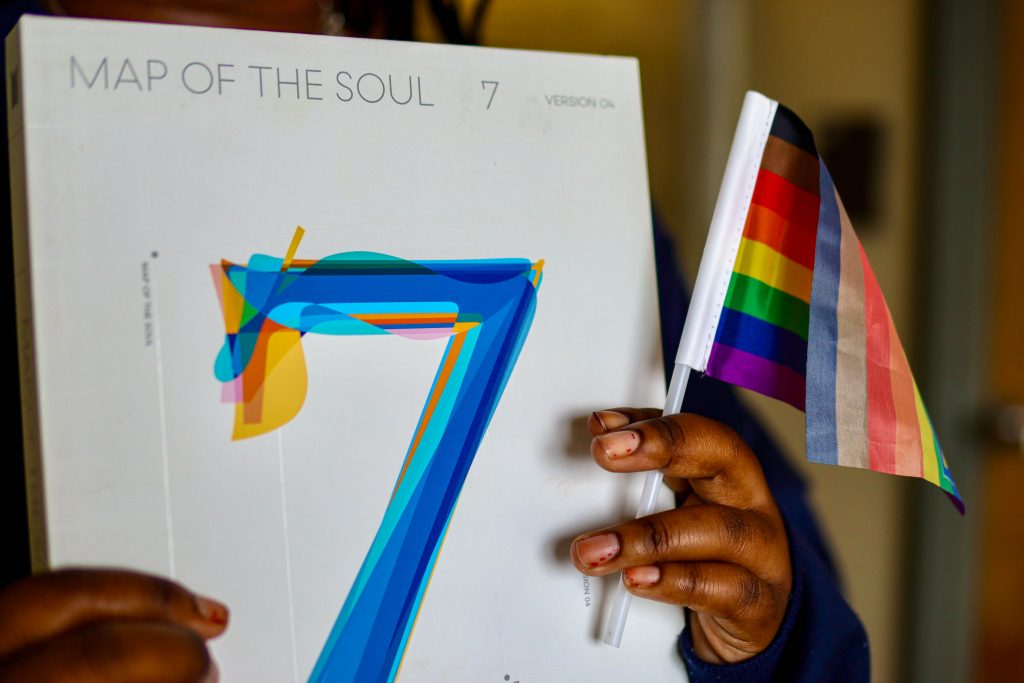
In March 2025, Lara Rajagopalan of HYBE x Geffen’s new girl group, KATSEYE, came out as queer on the group’s Weverse DMs which sparked a broader discussion online about queer idols and the growing, more obvious change that may be coming for the idol industry. KATSEYE debuted with their single “Debut” before following with their extended play, “Soft is Strong,” this past summer after going through the Dream Academy, a rigorous survival show. They are a multinational group with six members and are HYBE’s first group with this formula.
“…In Dream Academy, when it came out I was really scared… I didn’t know if people would accept me and I really thought it might ruin my chances of getting in… you all were so so nice about it and gave me so much love and support [and] it made me feel so confident in who I am, so I love you for that.” (Lara via Weverse DM).
Following this, Song Byeong-hee, better known as Bain of JUST B, came out as part of the LGBTQIA+ community at a show on their “JUST ODD” tour in Los Angeles. “I am proud to be a member of the LGTBQ community,” he said. While there have been idols who have come out in the past, Bain marks the first idol of an active boy group to come out as queer while still promoting with their group. Both Lara and Bain were met with love and support online and in person, especially from overseas fans, which may indicate a shift in the typically conservative culture of Korean society as a whole.
In a conservative country like South Korea, it remains extremely rare to be a queer celebrity, and even existing as a queer person openly is quite uncommon. Homophobia is still abundant, and unlike some other East Asian countries like Japan and Taiwan, they do not have any non-discriminatory laws to protect LGBTQ people. Taiwan has introduced same-sex marriage, and while Japan has not done the same, some Japanese cities offer marriage certificates. There are no such options in South Korea, and while being queer is not illegal, it is still considered taboo.
Korea’s idol industry operates under fantasy and in a highly manufactured manner. The personality idols share with the public is carefully curated, oftentimes by their companies. They must seem unattainable and perfect, but still human enough to gain support from fans. There are many rules for those who decide to be celebrities in the idol industry, and many entertainment companies implement a “no dating” policy to uphold the fantasy that these idols represent to fans. They do not want their audiences to see anything beneath the surface. Therefore, given that Korea is a generally conservative country, being an openly queer idol would shatter their carefully curated image, and “ruin” the relatability and parasocial fantasy they represent.
As K-pop becomes more and more global, forgetting the fantasy and favoring authenticity becomes more important. While Korean fans are harsher when it comes to scandals and dating because they feel more ownership over the idols, international fans are more interested in personal freedom and individuality. Companies must rethink the strategies they implement to make their groups successful because targeting only domestic fans does not work the same way anymore, and a group is only considered successful when it garners both domestic and international fandoms. These days, fans want to see honesty rather than perfection in the idol industry.
The bravery that these celebrities must have to publicly be themselves unapologetically is an indicator for a bigger conversation. Go Tae-seob, known better as his stage name, Holland, the first openly gay artist in Korea under an independent agency rather than a major label, has been struggling a lot with what it meant to be a gay K-pop artist in a country such as Korea. “My very existence was seen by some as a controversy, and by others, as something to be hidden,” said Holland. As more idols come out with their stories, there is more room for people to breathe, more room for members of the LGBTQ community to exist as themselves.
“This isn’t just about queer artists. It’s a moment that asks: Who is K-pop for? How far can this genre go?” (Holland via X).
Additionally, Youn Yuh-Joung, an Oscar-winning veteran actress, received overflowing support after stating that her oldest son is gay and happily married to a man in an overseas interview. The overall reaction to all of these moments has been positive and welcoming, and Yi Ho-Rim, an activist for LGBTQ+ rights in Korea, says “that alone feels like a signal that Korean society is starting to shift.”
There is a message to be heard about the idols who are coming out and living their truth. Their courage to share their stories despite how terrifying and potentially lonely it may be and the positive reaction that came shows that there is room for queer people to exist in spaces that they have not before; that they can be talented and multifaceted, and not simply known for being a queer celebrity. The more queer identities we see in mainstream media, the more LGBTQ+ individuals will be inspired to live bravely and unapologetically. It helps show them that maybe one day, they can also share their truth, and even if they never do, it shows them that they are not alone. The message is this: I see you, I hear you, you are allowed to exist like this.
“Coming out may be seen as courage for some, but for others, it’s survival. And for many, it’s love.” (Holland via X).


